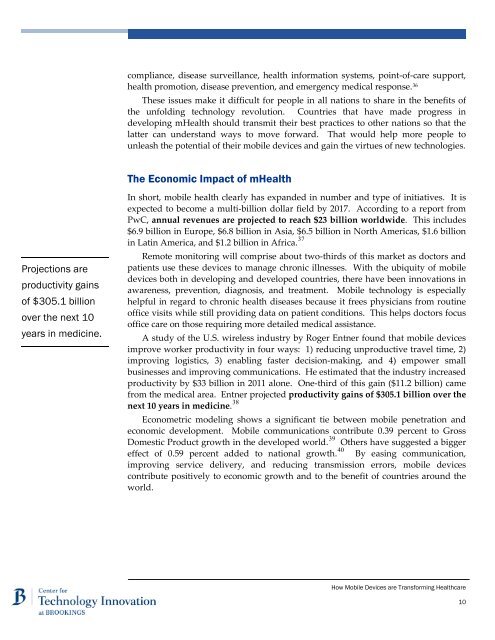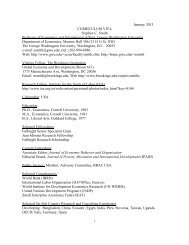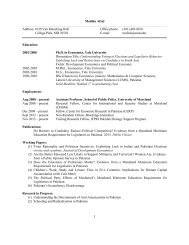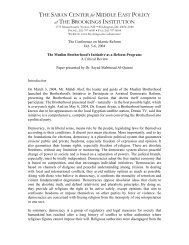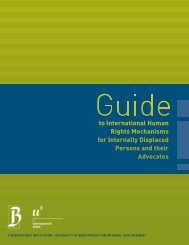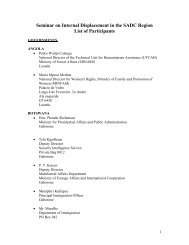How Mobile Devices are Transforming Healthcare - Brookings ...
How Mobile Devices are Transforming Healthcare - Brookings ...
How Mobile Devices are Transforming Healthcare - Brookings ...
You also want an ePaper? Increase the reach of your titles
YUMPU automatically turns print PDFs into web optimized ePapers that Google loves.
Projections <strong>are</strong><br />
productivity gains<br />
of $305.1 billion<br />
over the next 10<br />
years in medicine.<br />
compliance, disease surveillance, health information systems, point-of-c<strong>are</strong> support,<br />
health promotion, disease prevention, and emergency medical response. 36<br />
These issues make it difficult for people in all nations to sh<strong>are</strong> in the benefits of<br />
the unfolding technology revolution. Countries that have made progress in<br />
developing mHealth should transmit their best practices to other nations so that the<br />
latter can understand ways to move forward. That would help more people to<br />
unleash the potential of their mobile devices and gain the virtues of new technologies.<br />
The Economic Impact of mHealth<br />
In short, mobile health clearly has expanded in number and type of initiatives. It is<br />
expected to become a multi-billion dollar field by 2017. According to a report from<br />
PwC, annual revenues <strong>are</strong> projected to reach $23 billion worldwide. This includes<br />
$6.9 billion in Europe, $6.8 billion in Asia, $6.5 billion in North Americas, $1.6 billion<br />
in Latin America, and $1.2 billion in Africa. 37<br />
Remote monitoring will comprise about two-thirds of this market as doctors and<br />
patients use these devices to manage chronic illnesses. With the ubiquity of mobile<br />
devices both in developing and developed countries, there have been innovations in<br />
aw<strong>are</strong>ness, prevention, diagnosis, and treatment. <strong>Mobile</strong> technology is especially<br />
helpful in regard to chronic health diseases because it frees physicians from routine<br />
office visits while still providing data on patient conditions. This helps doctors focus<br />
office c<strong>are</strong> on those requiring more detailed medical assistance.<br />
A study of the U.S. wireless industry by Roger Entner found that mobile devices<br />
improve worker productivity in four ways: 1) reducing unproductive travel time, 2)<br />
improving logistics, 3) enabling faster decision-making, and 4) empower small<br />
businesses and improving communications. He estimated that the industry increased<br />
productivity by $33 billion in 2011 alone. One-third of this gain ($11.2 billion) came<br />
from the medical <strong>are</strong>a. Entner projected productivity gains of $305.1 billion over the<br />
next 10 years in medicine. 38<br />
Econometric modeling shows a significant tie between mobile penetration and<br />
economic development. <strong>Mobile</strong> communications contribute 0.39 percent to Gross<br />
Domestic Product growth in the developed world. 39 Others have suggested a bigger<br />
effect of 0.59 percent added to national growth. 40 By easing communication,<br />
improving service delivery, and reducing transmission errors, mobile devices<br />
contribute positively to economic growth and to the benefit of countries around the<br />
world.<br />
<strong>How</strong> <strong>Mobile</strong> <strong>Devices</strong> <strong>are</strong> <strong>Transforming</strong> Healthc<strong>are</strong><br />
10


